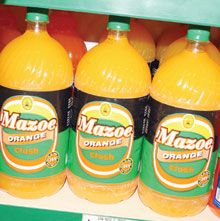Botswana's Zim imports take dive
Fraser Mpofu
Correspondent
| Wednesday July 30, 2008 00:00


According to a survey covering the whole of last year and conducted by the authoritative Confederation of Zimbabwe Industries (CZI), Botswana is the third biggest market for manufactured products from Zimbabwe.
During the same year, South Africa overtook Zambia as the biggest destination for Zimbabwean manufactured goods.
Zimbabwe's exports to South Africa jumped to 26.8 percent last year, up from 19.6 percent the previous year, says the CZI Manufacturing Sector Survey for 2007 issued last week.The CZI is the sole representative body of manufacturing companies in Zimbabwe with a membership that exceeds 1,000 companies. Zambia imported 23.2 percent of Zimbabwe's exports last year down from 26.2 in 2006, says the survey.
Zimbabwean exports into Malawi similarly fell from 12.5 in 2006 to 10.7 percent last year while exports to other Southern African Development Community (SADC) countries dropped by more than five percent from 12.5 to 7.1 percent.
However, exports to the rest of the world almost quadrupled from 3,6 percent in 2006 to 12,5 in 2007. In addition to South Africa, which imported more Zimbabwean manufactured goods, Mozambique registered a fair growth, from 5.4 percent in 2006 to 7.1 percent last year.
The CZI said it picked the surveyed manufacturing companies at random in cities such as Harare, Bulawayo, Gweru and Mutare. The results of the survey, said CZI must not be seen as the exact situation on the ground in terms of Zimbabwe's export performance as they could have arisen from the fact that the majority of companies visited are predominately exporters to South Africa.Explaining why Zimbabwean exports dropped in general last year, the CZI said the absence of credit because of the cutting of international credit lines by Western powers was most probably the biggest factor to blame.
Because of lack of credit, local companies failed to meet certain export orders. The result was that they were classified as unreliable on the international market and lost their market share.Another factor that depressed the exports is the continued depreciation of the Zimbabwe Dollar against major currencies.'Consequently, loss of confidence from foreign clients due to failure to deliver has found replacements from the East,' reads the CZI report in part.
'Rapid depreciation of the local currency against its major trading partners has made foreign currency expensive thereby rendering exports highly uncompetitive on the international scene'. Stringent foreign currency controls prompted by the shortage of hard currency, says the CZI, also tends to discourage exporters. Under the strict foreign currency requirements, exporters are obliged to surrender a portion of their proceeds to the Reserve Bank of Zimbabwe.
However, because of lack of foreign currency, it is sometimes difficult for the exporters to withdraw cash from their foreign currency accounts as the central bank sometimes raids the accounts to fund more pressing imports such as fuel, drugs, food and electricity.
Another factor that contributed to the decline in exports is the refusal to buy Zimbabwean products by some former traditional international clients.
